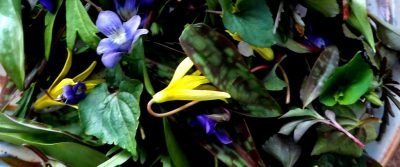
CURRICULUM
Here you can find out what material is included in each of the two years of our Community Herbalism program.
FUNDAMENTALS OF COMMUNITY HERBALISM COURSE CURRICULUM
Botany, ecology, plant taxonomy, evolution of plants, botanical vocabulary, plant identification.
Herbal actions and energetics, flavors of herbs and their meaning.
Wildcrafting procedures and ethics. Ecological responsibility.
Tools for fostering connection to place in any environment. Bioregional herbalism.
Embodied practices for learning from plants.
Making herbal medicines, including harvesting, processing and drying herbs, preparation of medicinal teas, tincturing by various methods, oxymels, elixirs, infused oils & salves, lotions, liniments, medicine balls, smoke medicine, and medicinal mushroom double-extractions.
Food as Medicine. Creative ways to consume herbs.
History and traditions of Western herbalism.
Holistic and Vitalist approaches to the human body in health & disease.
Nutrition fundamentals. Working with food allergies and intolerances.
Elemental patterns of imbalance in the human body (tissue states). Tools for assessing and addressing these imbalances.
Foundational anatomy and physiology.
In-depth teaching on over 60 individual herbs: botany & identification, tastes & energetics, actions, uses, formulation, contraindications, and cultivation tips. (Materia Medica)
Basic formulation.
Herbal first aid.
Practical tools for self- and community-care, including herbal support for healthy digestion, stress management, restful sleep, and more. Care for colds, flus, and other common infections.
Readings, discussions, and presentations on racial equity, gender inclusivity, decolonization, cultural appropriation, and other topics relevant to herbalism and health care.
Focused classes on: Herbalism on a Budget. Herbs for mental health. STI’s and genital care.
Advanced community herbalism course curriculum
Phytochemistry: the science needed to understand herbal actions and best medicine making practices
Advanced formulation: learning how to created nuanced formulas with precise dosage
History and lineage
In-depth holistic anatomy and physiology for all the organ systems
Holistic therapeutic strategies for all the organ systems
Formulation for the specific organ systems, learning differential diagnosis for herbs with an affinity for each organ system
In-depth teaching on dozens of individual herbs: botany & identification, tastes & energetics, actions, uses, formulation, contraindications, and cultivation tips. (Materia Medica)
Holistic approach to mental health
The physiology of emotional trauma, holistic tools for supporting people who have experienced trauma
Supporting trans health: framework and tools for supporting transfolk
Advanced first aid
Readings and discussions on neurodiversity, ableism in health care, and other topics
Applied community herbalism: how do we ethically serve our communities within our skill sets?
Workshop on racial equity in the field of herbalism with Amanda David and Mandana Boushee
Tincturing by percolation + making concentrated tinctures (fluidextract)
Herbalism & Mutual aid: considerations and best practices
Case studies from our clinical practices
Creating individualized protocols for complex conditions
Clinical Skills for Community herbalists including but not limited to:
scope of practice, boundaries, consent, pattern assessment, creating protocols, triage for complicated cases, reciprocity, when things go wrong, legalities, interview skills, apothecary considerations, referralsFocused classes on grief support, addiction, and more.
